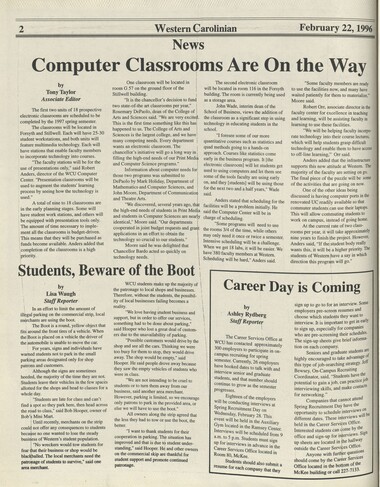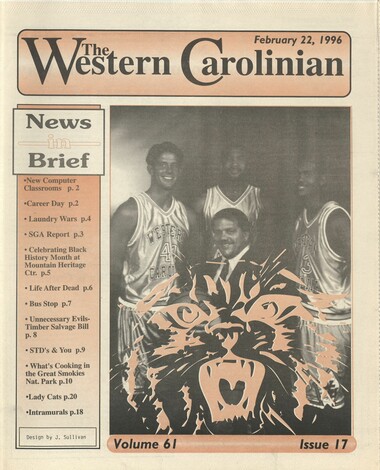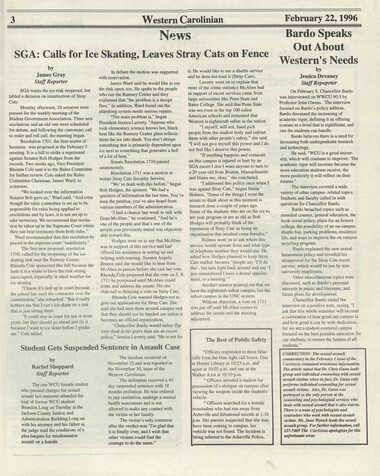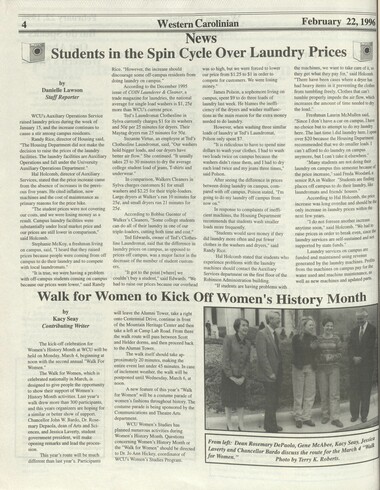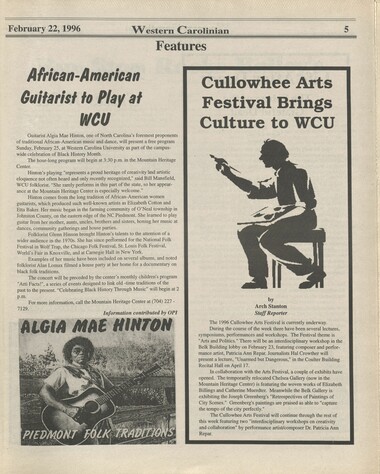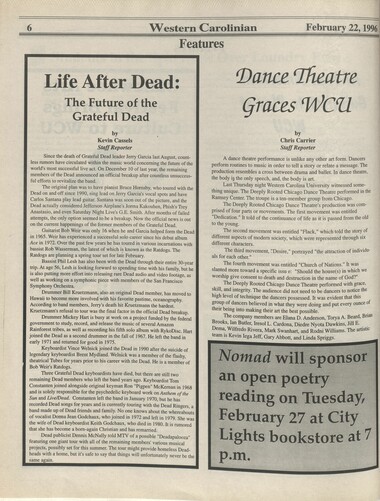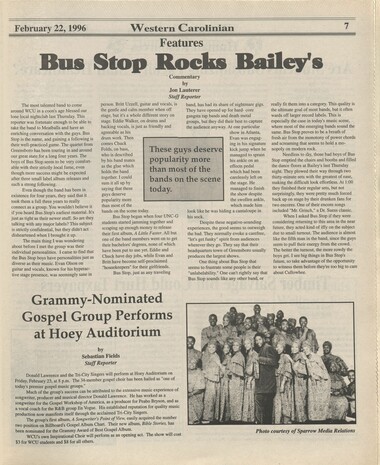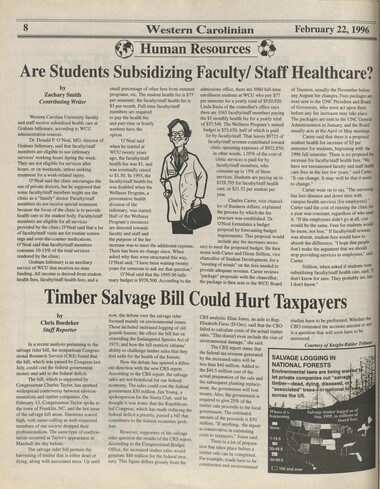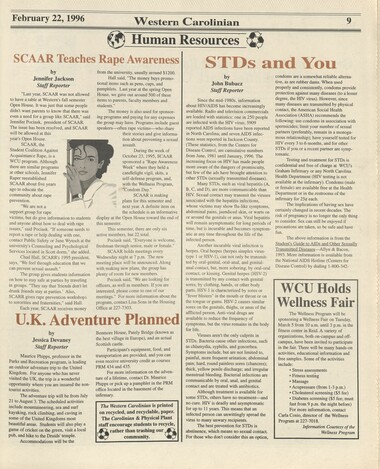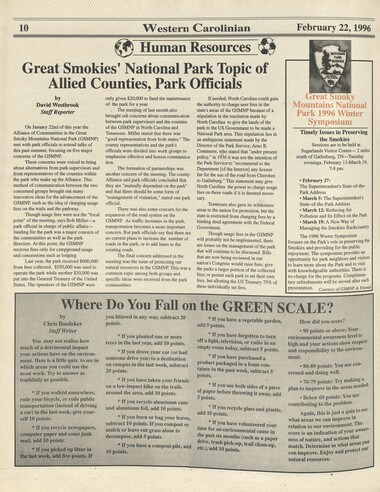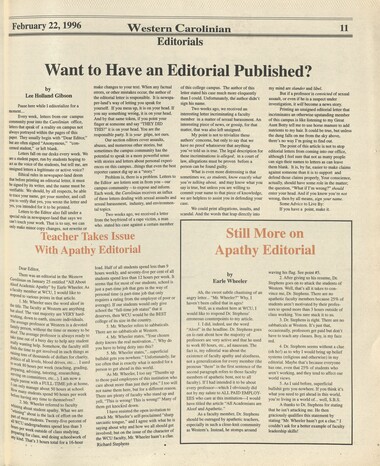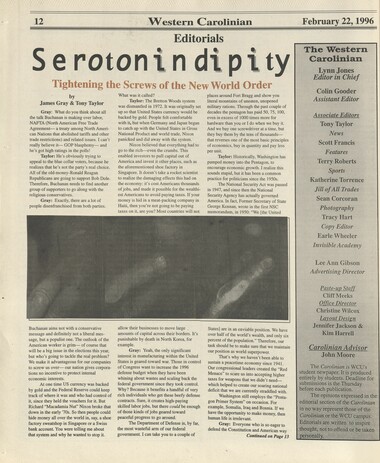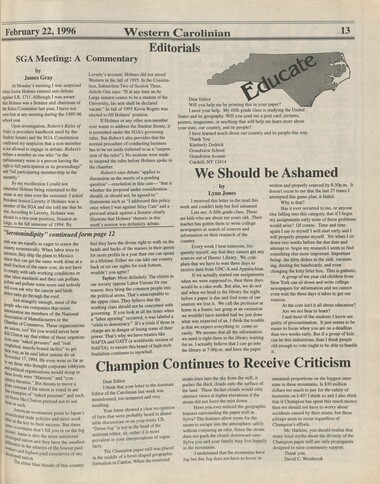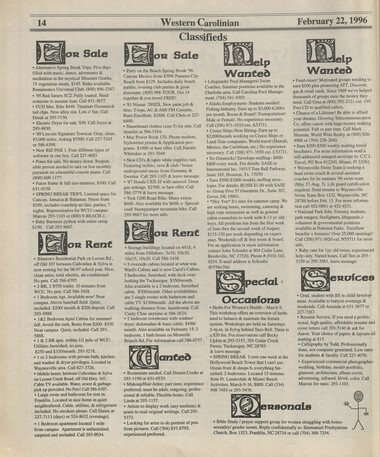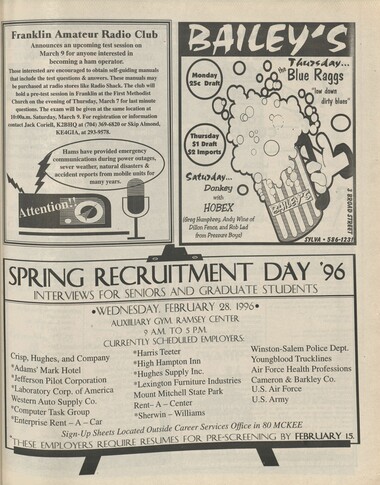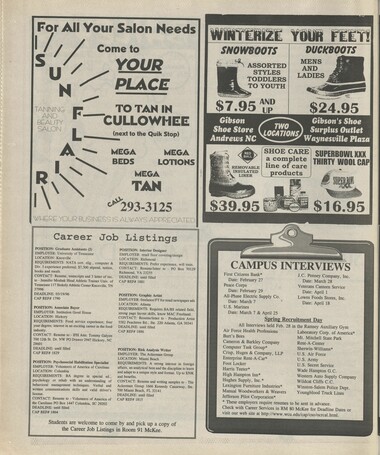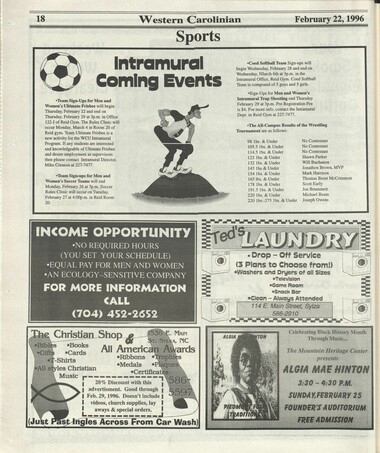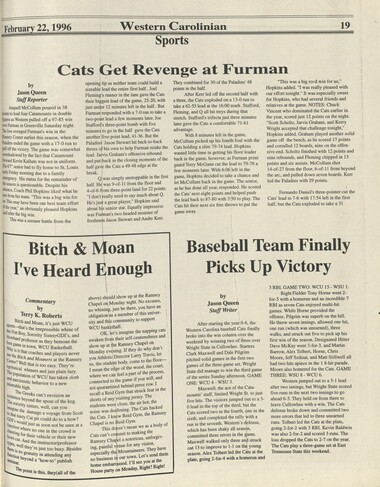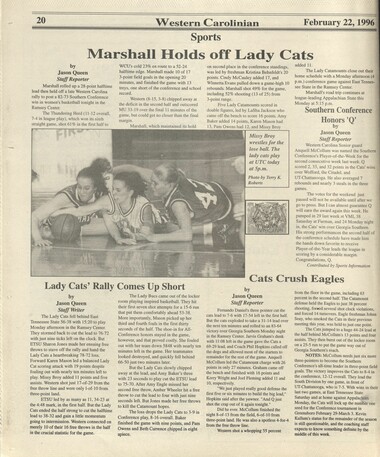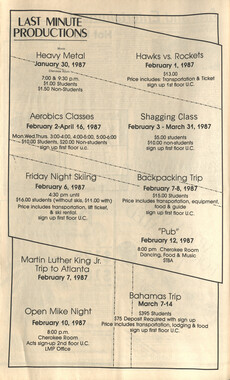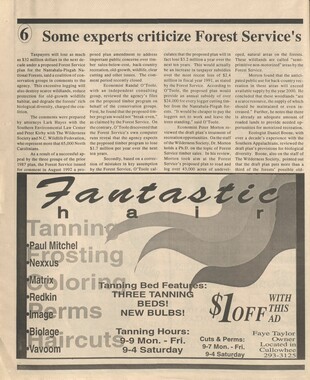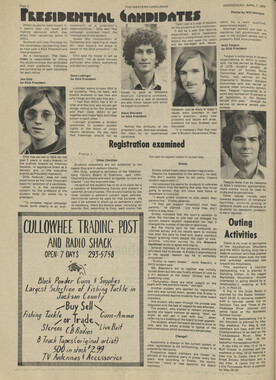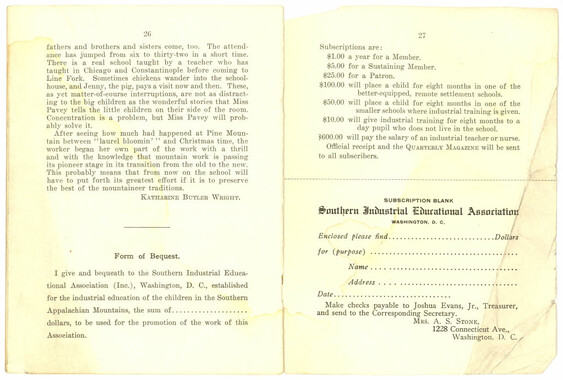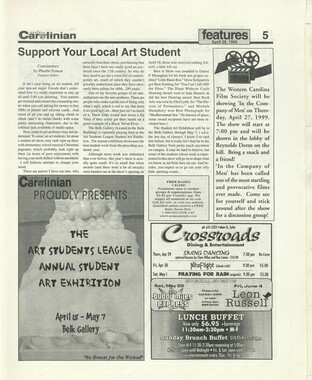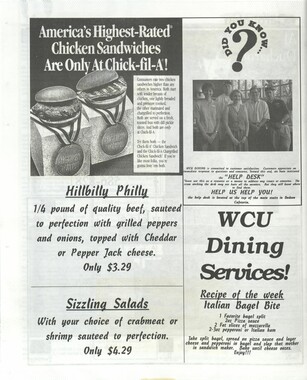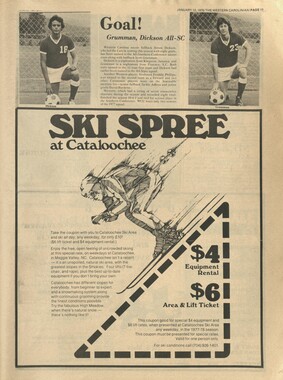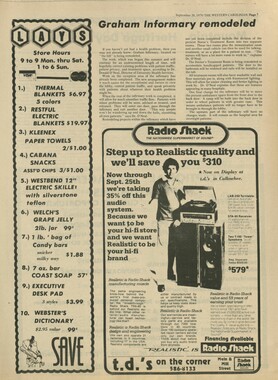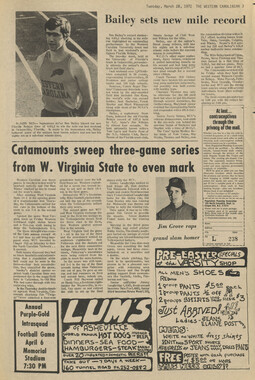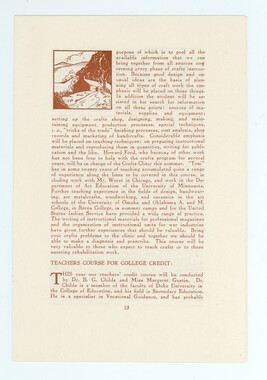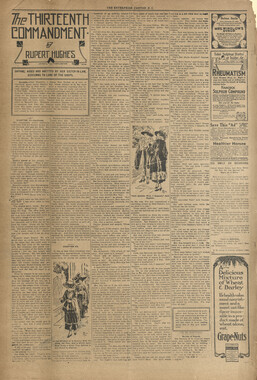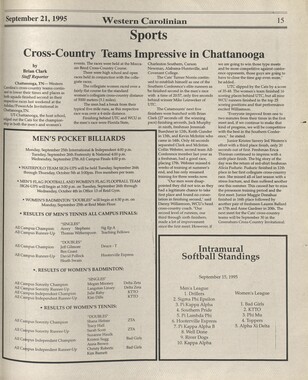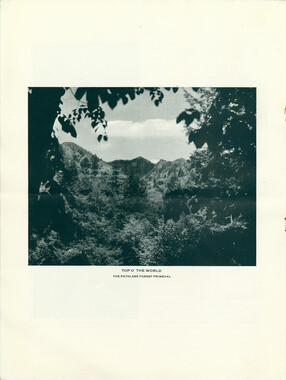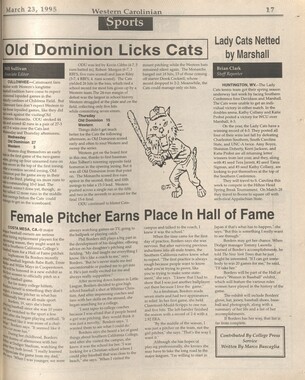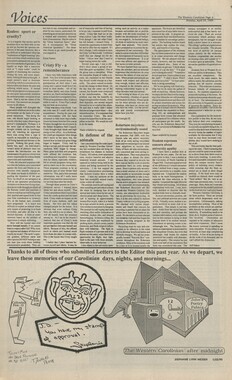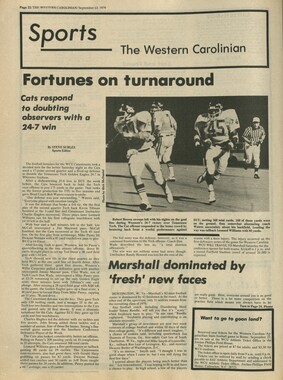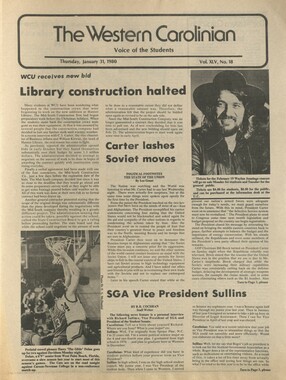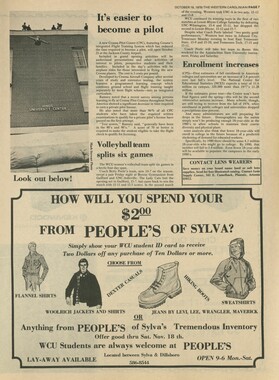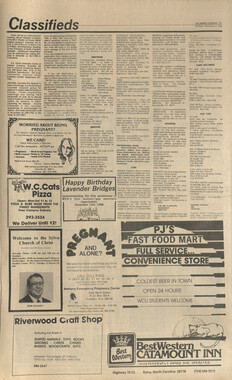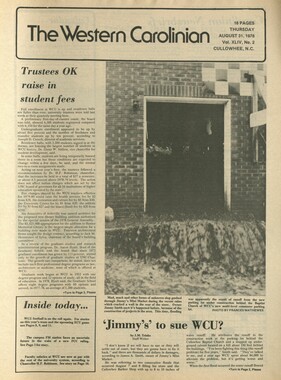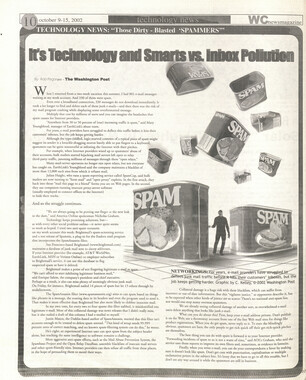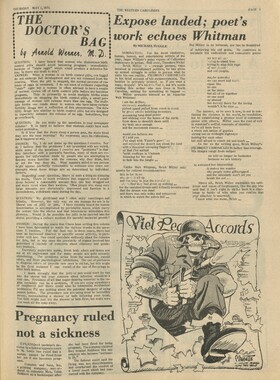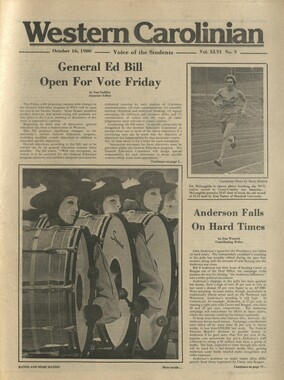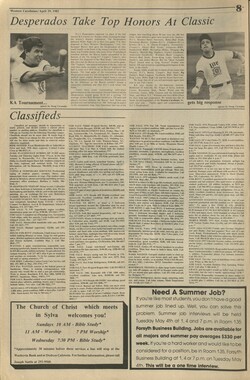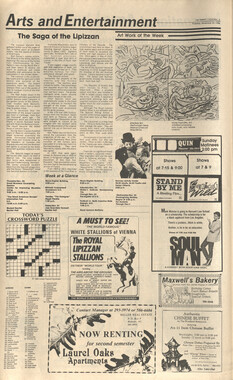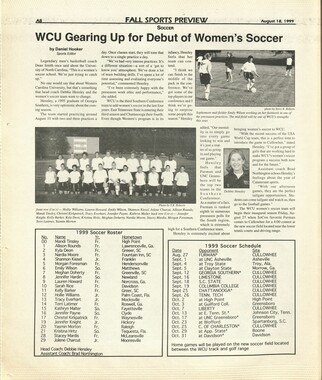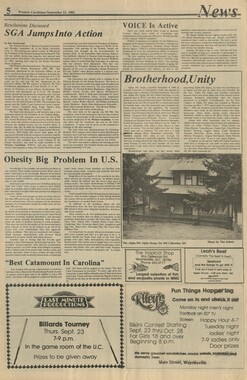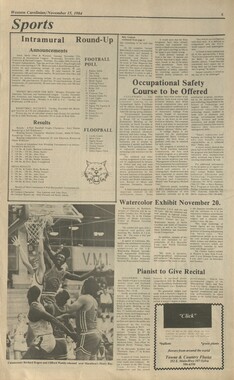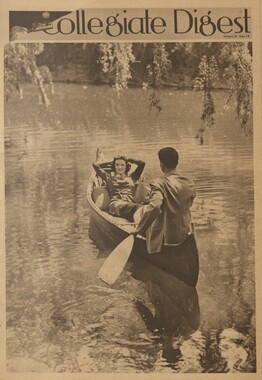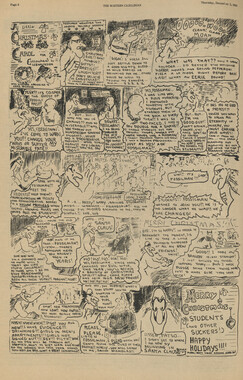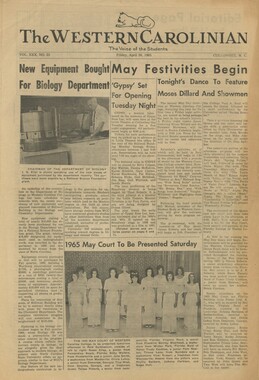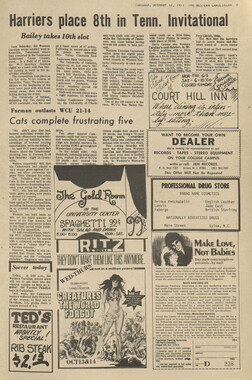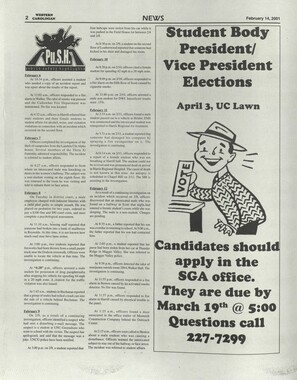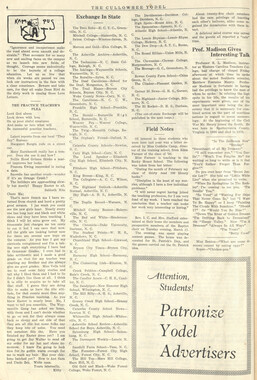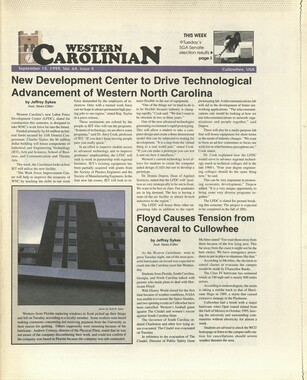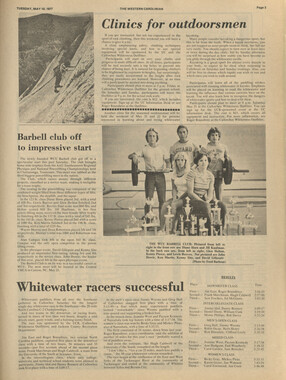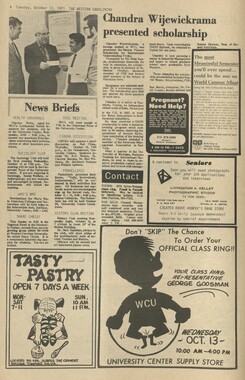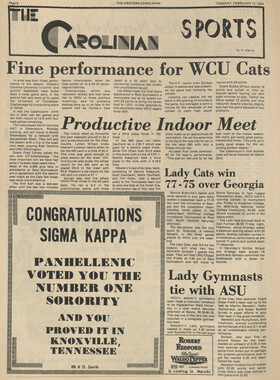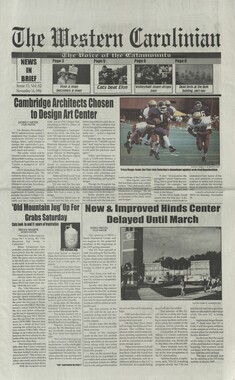Western Carolina University (20)
View all
- Canton Champion Fibre Company (2308)
- Cherokee Traditions (292)
- Civil War in Southern Appalachia (165)
- Craft Revival (1942)
- Great Smoky Mountains - A Park for America (2766)
- Highlights from Western Carolina University (430)
- Horace Kephart (941)
- Journeys Through Jackson (154)
- LGBTQIA+ Archive of Jackson County (85)
- Oral Histories of Western North Carolina (314)
- Picturing Appalachia (6772)
- Stories of Mountain Folk (413)
- Travel Western North Carolina (160)
- Western Carolina University Fine Art Museum Vitreograph Collection (129)
- Western Carolina University Herbarium (92)
- Western Carolina University: Making Memories (708)
- Western Carolina University Publications (2283)
- Western Carolina University Restricted Electronic Theses and Dissertations (146)
- Western North Carolina Regional Maps (71)
- World War II in Southern Appalachia (131)
University of North Carolina Asheville (6)
View all
- Allanstand Cottage Industries (62)
- Appalachian National Park Association (53)
- Bennett, Kelly, 1890-1974 (1388)
- Berry, Walter (76)
- Brasstown Carvers (40)
- Carver, George Washington, 1864?-1943 (26)
- Cathey, Joseph, 1803-1874 (1)
- Champion Fibre Company (233)
- Champion Paper and Fibre Company (297)
- Cherokee Indian Fair Association (16)
- Cherokee Language Program (22)
- Crowe, Amanda (40)
- Edmonston, Thomas Benton, 1842-1907 (7)
- Ensley, A. L. (Abraham Lincoln), 1865-1948 (275)
- Fromer, Irving Rhodes, 1913-1994 (70)
- George Butz (BFS 1907) (46)
- Goodrich, Frances Louisa (120)
- Grant, George Alexander, 1891-1964 (96)
- Heard, Marian Gladys (60)
- Kephart, Calvin, 1883-1969 (15)
- Kephart, Horace, 1862-1931 (313)
- Kephart, Laura, 1862-1954 (39)
- Laney, Gideon Thomas, 1889-1976 (439)
- Masa, George, 1881-1933 (61)
- McElhinney, William Julian, 1896-1953 (44)
- Niggli, Josephina, 1910-1983 (10)
- North Carolina Park Commission (105)
- Osborne, Kezia Stradley (9)
- Owens, Samuel Robert, 1918-1995 (11)
- Penland Weavers and Potters (36)
- Roberts, Vivienne (15)
- Roth, Albert, 1890-1974 (142)
- Schenck, Carl Alwin, 1868-1955 (1)
- Sherrill's Photography Studio (2565)
- Southern Highland Handicraft Guild (127)
- Southern Highlanders, Inc. (71)
- Stalcup, Jesse Bryson (46)
- Stearns, I. K. (213)
- Thompson, James Edward, 1880-1976 (226)
- United States. Indian Arts and Crafts Board (130)
- USFS (683)
- Vance, Zebulon Baird, 1830-1894 (1)
- Weaver, Zebulon, 1872-1948 (58)
- Western Carolina College (230)
- Western Carolina Teachers College (282)
- Western Carolina University (1794)
- Western Carolina University. Mountain Heritage Center (18)
- Whitman, Walt, 1819-1892 (10)
- Wilburn, Hiram Coleman, 1880-1967 (73)
- Williams, Isadora (3)
- Cain, Doreyl Ammons (0)
- Crittenden, Lorraine (0)
- Rhodes, Judy (0)
- Smith, Edward Clark (0)
- Appalachian Region, Southern (2569)
- Asheville (N.C.) (1923)
- Avery County (N.C.) (26)
- Blount County (Tenn.) (161)
- Buncombe County (N.C.) (1672)
- Cherokee County (N.C.) (283)
- Clay County (N.C.) (555)
- Graham County (N.C.) (233)
- Great Smoky Mountains National Park (N.C. and Tenn.) (519)
- Haywood County (N.C.) (3524)
- Henderson County (N.C.) (70)
- Jackson County (N.C.) (4694)
- Knox County (Tenn.) (25)
- Knoxville (Tenn.) (12)
- Lake Santeetlah (N.C.) (10)
- Macon County (N.C.) (420)
- Madison County (N.C.) (212)
- McDowell County (N.C.) (39)
- Mitchell County (N.C.) (132)
- Polk County (N.C.) (35)
- Qualla Boundary (981)
- Rutherford County (N.C.) (76)
- Swain County (N.C.) (2115)
- Transylvania County (N.C.) (270)
- Watauga County (N.C.) (12)
- Waynesville (N.C.) (84)
- Yancey County (N.C.) (72)
- Aerial Photographs (3)
- Aerial Views (60)
- Albums (books) (4)
- Articles (1)
- Artifacts (object Genre) (228)
- Bibliographies (1)
- Biography (general Genre) (2)
- Cards (information Artifacts) (38)
- Clippings (information Artifacts) (191)
- Crafts (art Genres) (622)
- Depictions (visual Works) (21)
- Design Drawings (1)
- Drawings (visual Works) (184)
- Envelopes (73)
- Facsimiles (reproductions) (1)
- Fiction (general Genre) (4)
- Financial Records (12)
- Fliers (printed Matter) (67)
- Glass Plate Negatives (381)
- Guidebooks (2)
- Internegatives (10)
- Interviews (815)
- Land Surveys (102)
- Letters (correspondence) (1013)
- Manuscripts (documents) (618)
- Maps (documents) (177)
- Memorandums (25)
- Minutes (administrative Records) (59)
- Negatives (photographs) (5835)
- Newsletters (1285)
- Newspapers (2)
- Occupation Currency (1)
- Paintings (visual Works) (1)
- Pen And Ink Drawings (1)
- Periodicals (193)
- Personal Narratives (10)
- Photographs (12976)
- Plans (maps) (1)
- Poetry (6)
- Portraits (4533)
- Postcards (329)
- Programs (documents) (151)
- Publications (documents) (2236)
- Questionnaires (65)
- Scrapbooks (282)
- Sheet Music (2)
- Slides (photographs) (402)
- Songs (musical Compositions) (2)
- Sound Recordings (796)
- Specimens (92)
- Speeches (documents) (15)
- Tintypes (photographs) (8)
- Transcripts (322)
- Video Recordings (physical Artifacts) (23)
- Vitreographs (129)
- Text Messages (0)
- A.L. Ensley Collection (275)
- Appalachian Industrial School Records (7)
- Appalachian National Park Association Records (336)
- Axley-Meroney Collection (2)
- Bayard Wootten Photograph Collection (20)
- Bethel Rural Community Organization Collection (7)
- Blumer Collection (5)
- C.W. Slagle Collection (20)
- Canton Area Historical Museum (2110)
- Carlos C. Campbell Collection (282)
- Cataloochee History Project (64)
- Cherokee Studies Collection (4)
- Daisy Dame Photograph Album (5)
- Daniel Boone VI Collection (1)
- Doris Ulmann Photograph Collection (112)
- Elizabeth H. Lasley Collection (1)
- Elizabeth Woolworth Szold Fleharty Collection (4)
- Frank Fry Collection (95)
- George Masa Collection (173)
- Gideon Laney Collection (452)
- Hazel Scarborough Collection (2)
- Hiram C. Wilburn Papers (28)
- Historic Photographs Collection (236)
- Horace Kephart Collection (861)
- Humbard Collection (33)
- Hunter and Weaver Families Collection (1)
- I. D. Blumenthal Collection (4)
- Isadora Williams Collection (4)
- Jesse Bryson Stalcup Collection (47)
- Jim Thompson Collection (224)
- John B. Battle Collection (7)
- John C. Campbell Folk School Records (80)
- John Parris Collection (6)
- Judaculla Rock project (2)
- Kelly Bennett Collection (1407)
- Love Family Papers (11)
- Major Wiley Parris Civil War Letters (3)
- Map Collection (12)
- McFee-Misemer Civil War Letters (34)
- Mountain Heritage Center Collection (4)
- Norburn - Robertson - Thomson Families Collection (44)
- Pauline Hood Collection (7)
- Pre-Guild Collection (2)
- Qualla Arts and Crafts Mutual Collection (12)
- R.A. Romanes Collection (681)
- Rosser H. Taylor Collection (1)
- Samuel Robert Owens Collection (94)
- Sara Madison Collection (144)
- Sherrill Studio Photo Collection (2558)
- Smoky Mountains Hiking Club Collection (616)
- Stories of Mountain Folk - Radio Programs (374)
- The Reporter, Western Carolina University (510)
- Venoy and Elizabeth Reed Collection (16)
- WCU Gender and Sexuality Oral History Project (32)
- WCU Mountain Heritage Center Oral Histories (25)
- WCU Oral History Collection - Mountain People, Mountain Lives (71)
- WCU Students Newspapers Collection (1744)
- Western North Carolina Tomorrow Black Oral History Project (69)
- William Williams Stringfield Collection (2)
- Zebulon Weaver Collection (109)
- African Americans (390)
- Appalachian Trail (35)
- Artisans (521)
- Cherokee art (84)
- Cherokee artists -- North Carolina (10)
- Cherokee language (21)
- Cherokee pottery (101)
- Cherokee women (208)
- Church buildings (170)
- Civilian Conservation Corps (U.S.) (110)
- College student newspapers and periodicals (1830)
- Dams (107)
- Dance (1023)
- Education (222)
- Floods (61)
- Folk music (1015)
- Forced removal, 1813-1903 (2)
- Forest conservation (220)
- Forests and forestry (1184)
- Gender nonconformity (4)
- Great Smoky Mountains National Park (N.C. and Tenn.) (181)
- Hunting (38)
- Landscape photography (25)
- Logging (118)
- Maps (83)
- Mines and mineral resources (8)
- North Carolina -- Maps (18)
- Paper industry (38)
- Postcards (255)
- Pottery (135)
- Railroad trains (71)
- Rural electrification -- North Carolina, Western (3)
- School integration -- Southern States (2)
- Segregation -- North Carolina, Western (5)
- Slavery (5)
- Sports (452)
- Storytelling (244)
- Waterfalls -- Great Smoky Mountains (N.C. and Tenn.) (66)
- Weaving -- Appalachian Region, Southern (280)
- Wood-carving -- Appalachian Region, Southern (328)
- World War, 1939-1945 (173)
Western Carolinian Volume 61 Number 17
Item
Item’s are ‘child’ level descriptions to ‘parent’ objects, (e.g. one page of a whole book).
-
-
Western Carolinian February 22,1996 News Computer Classrooms Are On the Way by Tony Taylor Associate Editor The first two units of 18 prospective electronic classrooms are scheduled to be completed by the 1997 spring semester. The classrooms will be located in Forsyth and Stillwell. Each will have 25-30 student workstations, and both units will feature multimedia technology. Each will have stations that enable faculty members to incorporate technology into courses. "The faculty stations will be for the use of presentations only," said Robert Anders, director of the WCU Computer Center. "Presentation classrooms will be used to augment the students' learning process by seeing how the technology is used." A total of nine to 18 classrooms are in the early planning stages. Some will have student work stations, and others will be equipped with presentation tools only. The amount of time necessary to implement all the classrooms is budget-driven. This means that they will be purchased as funds become available. Anders added that completion of the classrooms is a high (priority. One classroom will be located in room G 57 on the ground floor of the Stillwell building. | "It is the chancellor's decision to fund two state-of-the art classrooms per year," j Rosemary DePaolo, dean of the College of j Arts and Sciences said. "We are very excited. This is the first time something like this hasi happened to us. The College of Arts and Sciences is the largest college, and we have! many competing needs. Every department j wants an electronic classroom. The > chancellor's initiative will go a long way in' filling the high-end needs of our Print Media and Computer Science programs." Information about computer needs for those two programs was submitted to DePaolo by Mark Holiday, Department of Mathematics and Computer Sciences, and John Moore, Department of Communicatiot and Theatre Arts. "We discovered, several years ago, that the high-end needs of students in Print Media and students in Computer Sciences are nearly identical," Moore said. "Our departments cooperated in joint budget requests and grant applications in an effort to obtain the technology so crucial to our students." Moore said he was delighted that Chancellor Bardo acted so quickly on technology needs. Students, Beware of the Boot The second electronic classroom will be located in room 116 in the Forsyth building. The room is currently being used as a storage area. John Wade, interim dean of the School of Business, views the addition of the classroom as a significant step in using technology in educating students in the school. "I foresee some of our more quantitative courses such as statistics and quad methods going to a hands-on approach. Courses like statistics come early in the business program. It [the electronic classroom] will let students get used to using computers and let them see some of the tools faculty are using early on, and they [students] will be using those for the next two and a half years," Wade said. Anders stated that scheduling for the facilities will be a problem initially. He said the Computer Center will be in charge of scheduling. "Some programs will need to use the rooms 3/4 of the time, while others may only need it once or twice a semester. Intensive scheduling will be a challenge. When we get 18 labs, it will be easier. We have 380 faculty members at Western Scheduling will be hard," Anders said "Some faculty members are ready to use the facilities now, and many have waited patiently for them to materialize," Moore said. Robert Orr, associate director in the faculty center for excellence in teaching and learning, will be assisting faculty in learning to use these facilities. "We will be helping faculty incorporate technology into their course lectures, which will help students grasp difficult technology and enable them to have access to off-line learning," Orr said. Anders added that the infrastructure supports this new attitude at Western. The majority of the faculty are setting on go. The final piece of the puzzle will be some of the activities that are going on now. One of the other ideas being discussed is having computer ports in the renovated UC readily available so that commuter students can use their laptops. This will allow commuting students to work on campus, instead of going home. At the current rate of two classrooms per year, it will take approximately nine years to finish the project. However, Anders said, "If the student body really wants this, it will be a higher priority. The students of Western have a say in which direction this program will go." by Lisa Waugh Staff Reporter \ In an effort to limit the amount of illegal parking on the commercial strip, local merchants are using the boot. The Boot is a round, yellow object that fits around the front tires of a vehicle. When the Boot is placed on a vehicle the driver of the automobile is unable to move the car. For years, signs and individuals have warned students not to park in the small parking areas designated only for shop patrons and customers. Although the signs are sometimes heeded, the majority of the time they are not. Students leave their vehicles in the few spaces allotted for the shops and head to classes for a whole day. "Students are late for class and can't find a spot so they park here, then head across the road to class," said Bob Hooper, owner of Bob's Mini Mart. : Until recently, merchants on the strip could not offer any consequences to students because no one wanted to lose the steady business of Western's student population. "No wreckers would tow students for fear that their business or shop would be blackballed. The local merchants need the patronage of students to survive," said one area merchant. WCU students make up the majority of the patronage to local shops and businesses. Therefore, without the students, the possibility of local businesses failing becomes a reality. "We love having student business and support, but in order to offer our services, something had to be done about parking," said Hooper who lost a great deal of customers due to the unavailability of parking. "Possible customers would drive by the shop and see all the cars. Thinking we were too busy for them to stop, they would drive away. The shop would be empty," said Hooper. He said people drove away because they saw the empty vehicles of students who were in class. "We are not intending to be cruel to students or to turn them away from our business, said another area merchant. However, parking is limited, so we encourage only patrons to park in the provided area, or else we will have to use the boot." All owners along the strip agreed that the less they had to tow or use the boot, the better. "I want to thank students for their cooperation in parking. The situation has improved and that is due to student understanding," said Hooper. He and other owners on the commercial skip are thankful for student support and promote continued patronage. Career Day is Coming by Ashley Rydberg Staff Reporter wnTTIhe Career Service* 0ffice at WCU has contacted approximately 300 employers to participate in on- campus recruiting for spring semester. Currently, 26 employers have booked dates to talk with and interview senior and graduate students, and that number should continue to grow as the semester progresses. Eighteen of the employers will be conducting interviews at ^Prmg Recruitment Day on Wednesday, February 28 This event will be held in the Auxiliary Gym located in the Ramsey Center nterviewswil, be schedule^ ^mft0 5 P.m. Students must sign up for ,nterv,ews in advance in'he Career Serv,ces Office located in Room 80, McKee. resUm!fUdentSuh0Ulda,S0subl«»a ^sume for each company thatthey sign up to go to for an interview. Some employers pre-screen resumes and choose which students they want to interview. It is important to get in early to sign up, especially for companies who are pre-screening their schedules. The sign-up sheets give brief information on each company. Seniors and graduate students are highly encouraged to take advantage ot this type of job-searching strategy. Jen Bewsey, On-Campus Recruiting Coordinator, said, "Students have the^ potential to gain a job, can practice jo interviewing skills, and make contacts for networking." Companies that cannot attend Spring Recruitment Day have the opportunity to schedule interviews on different dates. These interviews wil held in the Career Services Office. Interested students can come by the office and sign-up for interviews. bit up sheets are located in (he hallway outside the Career Services Office- Anyone with further questions should come by the Career Services Office located in the bottom of the McKee building or call 227-7133
Object
Object’s are ‘parent’ level descriptions to ‘children’ items, (e.g. a book with pages).
-
The Western Carolinian is Western Carolina University's student-run newspaper. The paper was published as the Cullowhee Yodel from 1924 to 1931 before changing its name to The Western Carolinian in 1933.
-
